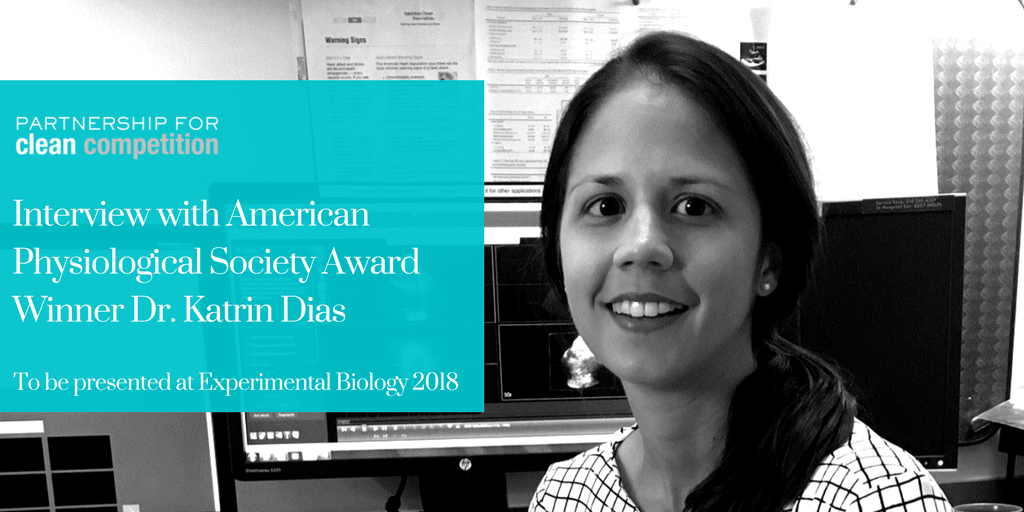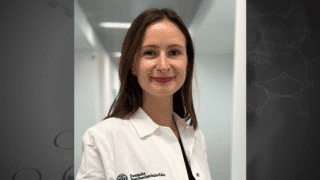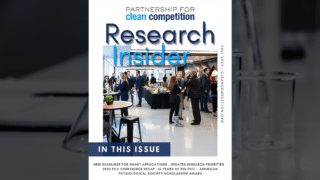The PCC is proud to support young scientific investigators around the world committed to high quality research and discovery. To this end, the PCC supports two American Physiological Society Awards annually: The PCC Postdoctoral Award and the PCC Graduate Award. Both are presented at the annual Experimental Biology meeting to recognize outstanding research by young investigators.
This year’s Postdoctoral Award will be presented to Dr. Katrin Dias, a PhD Fellow working with Dr. Benjamin Levine, Director of the Institute for Exercise and Environmental Medicine at the University of Texas Southwestern. The PCC is especially proud that Dr. Dias is being awarded for a PCC funded project, “Effects of chronic Xenon supplementation on hematological parameters, cardiorespiratory.
In the following interview, Katrin sheds light on how her research provides critical information on the safety profile of xenon for both athletes and the average citizen.
What question or challenge were setting out to address when you chose your current field?
In late 2012, the scientific community became aware that Russian athletes were allegedly breathing xenon, a known anaesthetic agent, for short periods of time to increase their athletic performance. At the time, there was no credible information about the xenon inhalation process, and whether doing so was effective for improving athletic performance. Our research group sought to determine the safety, detection, and efficacy of acute and chronic xenon inhalation in healthy individuals.
How would you explain your current research to a stranger on a bus?
My research aimed to determine whether four weeks of xenon inhalation would result in improvements in athletic performance and fitness, and change blood parameters known to increase performance. Xenon is a known anaesthetic agent with the potential to increase the oxygen carrying capacity of red blood cells, which in theory should improve athletic performance. In order to test this, we took a group of fourteen individuals, and tested their blood, assessed their fitness on a treadmill test and measured running performance using a 3 km time trial. The group was then split into two; seven individuals inhaled xenon for 2 minutes on three days per week for four weeks, while the other seven individuals inhaled a sham gas using the same dosing schedule as the xenon group. At the end of the 4-week period, we re-tested their blood, fitness, and athletic performance. To our surprise, we did not see any differences in measures between the two groups, suggesting that chronic xenon inhalation does not improve fitness or athletic performance, or favorably change blood parameters.
Why is your area of scientific discovery important for the ordinary citizen?
Our research into xenon doping has given both the scientific community but also ordinary citizens much needed knowledge regarding the safety of xenon inhalation practices. It is important for the community to understand that the safety profile of xenon, prior to our research study, was relatively unknown. We believe that high doses of xenon given by inexperienced individuals can result in severe consequences, including death. Our findings support this; at low doses of xenon exposure, individuals were very drowsy but became significantly more sedated with a higher dose. Some individuals were also subconsciously restless and agitated. Importantly, we found that individuals could not independently operate equipment (such as valves) to perform self-administration at any dose, which supports the decision to ban xenon as without the presence of a certified medical professional, inhaling xenon could be life threatening. A number of individuals who participated in the study also complained of severe nausea and symptoms that resembled sleep paralysis, which extended several hours after inhalation.
What’s the coolest thing about your work?
I don’t usually consider my research as ‘work’, and that’s probably the coolest thing about it. Every day is different and having the opportunity to engage in a variety of activities over the course of a week or even a day really motivates me and drives my commitment to research. I will always be passionate about exercise physiology and cherish occasions where I can discuss my work with other scientists or the general community. I trust that what we do contributes to scientific knowledge and that this knowledge will either immediately or eventually help other people, whether they be athletes, patients, or even other researchers in the field.
Do you believe your research could carry over into/complement the anti-doping field?
We do believe that our research bears significance for the anti-doping field. Not only have we gathered information regarding the ability to detect xenon, but our project is also one of the first to document the safety of breathing sub-anaesthetic doses of this gas. With regards to detection, our research group found that xenon can be traced in the blood and urine, depending on the concentration of xenon inhaled, for up to 6 hours following exposure. This knowledge aids in structuring anti-doping testing schedules, particularly given the relatively short window for detection of this substance. Our data also provides evidence for doping agencies to make informed decisions regarding whether xenon should be banned by answering two questions; does xenon represent an actual or potential health risk to the athlete and does it have the potential to enhance sports performance.
Katrin completed her doctoral training in exercise physiology with Professor Jeff Coombes at The University of Queensland, focusing on the effect of high intensity exercise training in children with obesity on cardiac and vascular function, and visceral adiposity. Her long-term research goal is to understand the role of exercise, specifically of a high intensity, in health and disease. Katrin is currently completing her postdoctoral research fellowship with Dr. Benjamin Levine at the Institute for Exercise and Environmental Medicine, where she has had the opportunity to expand her expertise by leading a PCC-sponsored research project investigating the effect of chronic xenon inhalation on athletic performance.




